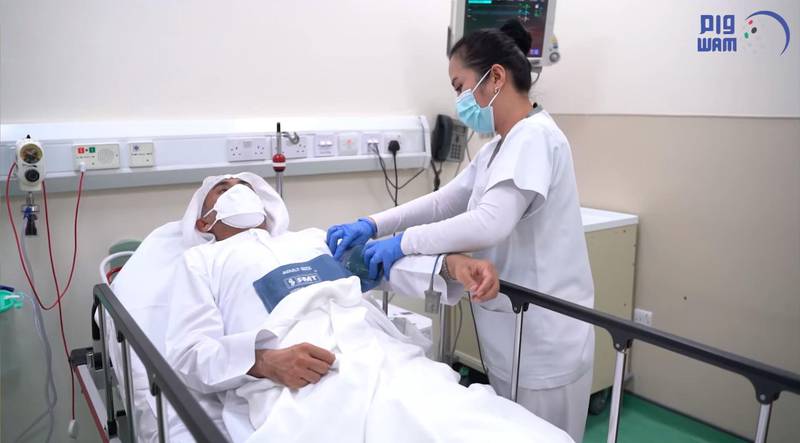WHO warns against antibody treatments for Covid in U-turn on previous advice

The World Health Organisation has reversed its stance on antibody treatments for Covid-19, with its new guidance now advising against their use.
The about turn means drugs including sotrovimab and casirivimab-imdevimab are now not recommended for Covid patients by a WHO Guideline Development Group of international experts, whose findings were published on Thursday in The BMJ.Read More : WHO Europe expects more monkeypox-related deaths The antibody drugs work by binding to the Sars-CoV-2 spike protein, neutralising the virus’s ability to infect cells, but emerging evidence from laboratory studies suggest these drugs are not likely to work against currently circulating variants such as Omicron.
After weighing up the evidence, the panel judged that almost all well-informed patients would not choose to receive sotrovimab nor casirivimab-imdevimab.
In the same guideline update, the WHO makes a conditional recommendation for the use of the antiviral drug remdesivir in patients with severe Covid-19, and a conditional recommendation against its use in patients with critical Covid-19.
These recommendations are based on results from five randomised trials involving 7,643 patients, showing 13 fewer deaths per 1,000 patients with severe Covid-19 taking remdesivir, but 34 more deaths per 1,000 patients with critical Covid-19 taking the drug.
The new trial data provided sufficiently trustworthy evidence to demonstrate benefits in patients with severe but not critical Covid-19. The panel considered the benefits of remdesivir to be modest and of moderate certainty for key outcomes such as mortality and mechanical ventilation, resulting in a conditional recommendation.
Arthritis drugs repurposed
The WHO also advised that three drugs used to treat arthritis — the IL-6 receptor blockers tocilizumab or sarilumab and the JAK inhibitor baricitinib — may now be combined, in addition to corticosteroids, in patients with severe or critical Covid-19.
This advice is based on new high-certainty trial evidence confirming a survival benefit for baricitinib with little or no serious adverse events when given in combination with corticosteroids and IL-6 receptor blockers.
However, the panel acknowledged some cost and resource implications associated with these drugs, which they say could exacerbate health inequities. The recommendations are part of a living guideline, developed by the WHO with the methodological support of Magic Evidence Ecosystem Foundation, to provide up-to-date, trustworthy guidance on the management of Covid-19 and to help doctors make better decisions with their patients.
Living guidelines are useful in fast-moving research areas such as coronavirus because they allow researchers to update previously vetted and peer-reviewed evidence summaries as new information becomes available.
Previously, the WHO has made a strong recommendation for use of nirmatrelvir and ritonavir, and a conditional recommendation for molnupiravir for high-risk patients with non-severe Covid-19. The WHO advises against the use of ivermectin and hydroxychloroquine in patients with Covid-19, regardless of disease severity.
The about turn means drugs including sotrovimab and casirivimab-imdevimab are now not recommended for Covid patients by a WHO Guideline Development Group of international experts, whose findings were published on Thursday in The BMJ.
After weighing up the evidence, the panel judged that almost all well-informed patients would not choose to receive sotrovimab nor casirivimab-imdevimab.
In the same guideline update, the WHO makes a conditional recommendation for the use of the antiviral drug remdesivir in patients with severe Covid-19, and a conditional recommendation against its use in patients with critical Covid-19.
These recommendations are based on results from five randomised trials involving 7,643 patients, showing 13 fewer deaths per 1,000 patients with severe Covid-19 taking remdesivir, but 34 more deaths per 1,000 patients with critical Covid-19 taking the drug.
The new trial data provided sufficiently trustworthy evidence to demonstrate benefits in patients with severe but not critical Covid-19. The panel considered the benefits of remdesivir to be modest and of moderate certainty for key outcomes such as mortality and mechanical ventilation, resulting in a conditional recommendation.
Arthritis drugs repurposed
The WHO also advised that three drugs used to treat arthritis — the IL-6 receptor blockers tocilizumab or sarilumab and the JAK inhibitor baricitinib — may now be combined, in addition to corticosteroids, in patients with severe or critical Covid-19.
This advice is based on new high-certainty trial evidence confirming a survival benefit for baricitinib with little or no serious adverse events when given in combination with corticosteroids and IL-6 receptor blockers.
However, the panel acknowledged some cost and resource implications associated with these drugs, which they say could exacerbate health inequities. The recommendations are part of a living guideline, developed by the WHO with the methodological support of Magic Evidence Ecosystem Foundation, to provide up-to-date, trustworthy guidance on the management of Covid-19 and to help doctors make better decisions with their patients.
Living guidelines are useful in fast-moving research areas such as coronavirus because they allow researchers to update previously vetted and peer-reviewed evidence summaries as new information becomes available.
Previously, the WHO has made a strong recommendation for use of nirmatrelvir and ritonavir, and a conditional recommendation for molnupiravir for high-risk patients with non-severe Covid-19. The WHO advises against the use of ivermectin and hydroxychloroquine in patients with Covid-19, regardless of disease severity.
Source: www.thenationalnews.com
